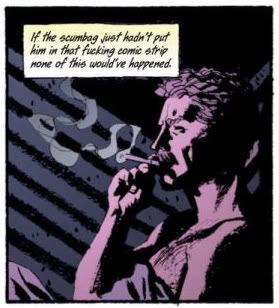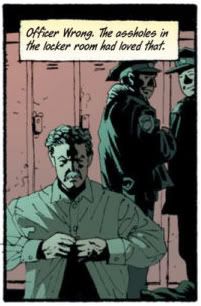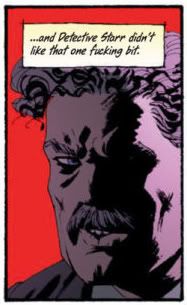Nothing is More Dangerous Than a Comics Artist: Jog knew the truth on 12/4
/![]() Criminal Vol. 2 #7
Criminal Vol. 2 #7

And so another tale from Ed Brubaker (writin'), Sean Phillips (drawin') & Val Staples (colorin') crashes to its close, as does another run of Criminal itself. It's going on hiatus until May 2009 or so, while the team works on the creator-owned supervillain-in-witness-protection series Incognito, although it won't relaunch or anything once it's back (so, next issue will be vol. 2 #8). In case you're getting tripped up by the pamphlets/trades numbering, vol. 1 of the Criminal pamphlet series covered the first two trade paperbacks (Coward and Lawless), while the newish The Dead and the Dying trade hits issues #1-3 of the second pamphlet series.
I like the pamphlets, myself; if you're gonna charge $3.50, it helps to be 36 pages, ad-free and stocked with little bonus essays on the crime genre, on top of being rather nicely designed. These things look nice sitting around in a pile, which is usually how I've got them arranged, since I rarely read them as they come out. I guess that's a little irony there - a series I like having as individual comic books that I wind up reading in big, 'collected' chunks anyway.
But that's how I've found they work best, now that we're up to the fourth storyline - it's all structured nicely enough as chapters, but the real big impact demands at least an all-at-once re-read, and even then maybe a quick skim of past storylines, since Brubaker isn't even limiting himself to individual trades. No, this is a huge, sprawling intergenerational saga at heart, with the big, beating theme of family -- both a driving force and a font of poison -- keeping steady time from its center.

Anyway, this issue ends the sad saga of Jacob Kurtz, that very troubled author of the series' surreal daily newpaper detective comic, Frank Kafka, P.I. The strip first popped up in issue #1 of vol. 1, so little connections have been present for a while - Jacob is a former counterfeiter, and old friends with Tracy Lawless (of Lawless), whose thoroughly awful father (of The Dead and the Dying) used to pal around with Jacob's own dad.
Jacob also used to be married to the niece of local syndicate head Sebastian Hyde, which got him into all sorts of trouble after the woman vanished without a trace, and Jacob got branded her murderer by the law and the media. He was abused by the police and crippled by Hyde's men, although after his wife's body was found and the death deemed an accident the boss did offer Jacob a lifetime job drawing his Frank Kafka comic, thus evoking the old tale of Krazy Kat's endurance at the behest of William Randolph Hearst, except with severe beatings. Drawing comics is hard, as the insomniac Jacob knows, but he's pretty close to his character, by which I mean he literally sees him standing around and urging him to take tough-guy action when he really shouldn't.
Laying it out this way makes it seem obvious that Jacob, also the story's narrator, might not have the most trustworthy point of view. The beauty of this storyline is that Brubaker has let this implication lay low, allowing his story to proceed for much of its length like a typical Criminal storyline -- it involves a forged FBI badge, a heap of Chinese triad money, a femme fatale, her boorish thug boyfriend and a police detective who still can't let go of Jacob's presumed guilt, particularly since the artist has been totally busting his balls in his comic -- then suddenly kicking the whole thing into a mess of subjectivity that not only messes with the plot but gently pokes at the kind of plots this comic has been working with so far.
This issue's the one that kicks, and it puts some weight behind it. Even the structure of the storyline gets knocked around, as Brubaker basically stops the plot at two points to back up and present scenes from the point of view of the detective and the femme fatale, with an omniscient narrator suddenly provided to free them from Jacob's skewed perspective. In less assured hands it could have come off as a clanking mechanism for filling out the backstory, but Brubaker seizes the opportunity to present these characters as slightly more complicated than the simple archetypes Jacob (who hears the voice of a fictional noir detective in his head, remember) has fit them into via the plot that is his life. Too much time alone drawing crime funnies, I think!

Eventually the truth is revealed, and earlier sequences take on new connotations. The comic drifts a little over the top. Criminal does that sometimes, but while Coward launched itself into guns-blazing one man army nonsense, to its detriment, Bad Night is strippers-in-the-mental-ward good, a real nightmare party of ruinous perception, with a nice crack-up scene and the best atmosphere of doom the series has yet managed. I'm not mentioning much about Phillips & Staples here, since they're mostly working from the same level of quality as before (although Jacob's tortured body language deserves note), but be assured that they compliment Brubaker's writing as nicely as expected.
I'm glad I read this all in one shot; it's even worth reading again after that, since there's a subtlety to Brubaker's characterizations that only comes out once everyone's motives and desires are at hand. This bolsters the story's affirmation of its primary cast as error-prone people, longing for affection (since the 'family' here is most emphatically that of romantic partners) or pursuing a kind of virtue, if generally in the worst ways. It also empowers the onrushing horror of the tale's conclusion, with one person demanding emotional truths from another, and the reader getting the sinking impression that there's no way of knowing what's authentic anymore, not in a story told like this, and just when it's most important. VERY GOOD.











